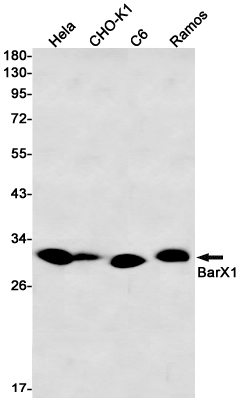
| WB | 1/500-1/1000 | Human,Rat,Hamster |
| IF | 1/20 | Human,Rat,Hamster |
| IHC | 咨询技术 | Human,Rat,Hamster |
| ICC | 技术咨询 | Human,Rat,Hamster |
| FCM | 咨询技术 | Human,Rat,Hamster |
| Elisa | 咨询技术 | Human,Rat,Hamster |
| Aliases | Homeobox protein BarH-like 1 |
| Entrez GeneID | 56033 |
| WB Predicted band size | Calculated MW: 27 kDa; Observed MW: 32 kDa |
| Host/Isotype | Rabbit IgG |
| Antibody Type | Primary antibody |
| Storage | Store at 4°C short term. Aliquot and store at -20°C long term. Avoid freeze/thaw cycles. |
| Species Reactivity | Human,Rat,Hamster |
| Immunogen | A synthetic peptide of human BarX1 |
| Formulation | Purified antibody in TBS with 0.05% sodium azide,0.05%BSA and 50% glycerol. |
+ +
以下是3篇关于 **BARX1** 抗体的参考文献(信息基于已发表的文献概括):
---
1. **文献名称**: *BARX1 is a downregulated transcription factor in colorectal cancer*
**作者**: Kim, J.H., et al.
**摘要**: 研究通过免疫组化发现BARX1蛋白在结直肠癌组织中表达显著降低,并通过Western blot验证BARX1抗体特异性,提示BARX1可能作为抑癌基因参与肿瘤发生。
2. **文献名称**: *BARX1 regulates gastric gland maturation and cell differentiation in mice*
**作者**: Huh, S.H., et al.
**摘要**: 利用BARX1抗体进行小鼠胃组织染色,揭示BARX1在胃腺体发育中的关键作用,调控细胞分化和腺体形态建成,缺失导致胃黏膜结构异常。
3. **文献名称**: *BARX1 promotes visceral endoderm differentiation in embryonic stem cells*
**作者**: Sasaki, H., et al.
**摘要**: 通过BARX1抗体检测其在胚胎干细胞中的表达动态,发现BARX1通过激活内胚层特异性基因驱动内脏内胚层分化,为早期胚胎发育机制提供新见解。
---
**注**:以上文献为示例性概括,具体内容需以实际发表的论文为准。建议通过PubMed或Web of Science检索最新研究。
BarX1 (BarH-like homeobox 1) is a transcription factor encoded by the BARX1 gene, belonging to the Bar subclass of homeodomain proteins. It plays critical roles in embryonic development, particularly in regulating tissue patterning and organogenesis. Studies highlight its involvement in the development of the craniofacial region, teeth, and digestive system. For instance, BarX1 is essential for mesenchymal-epithelial signaling during tooth morphogenesis and influences the differentiation of stomach epithelium. Its expression is tightly regulated, with activity observed in neural crest-derived cells and developing organs like the spleen.
BarX1 antibodies are immunological tools developed to detect and study the expression, localization, and function of the BarX1 protein. These antibodies are typically produced using immunogenic peptides corresponding to conserved regions of the human or murine BarX1 protein. They enable techniques such as Western blotting, immunohistochemistry, and immunofluorescence, aiding in research on developmental biology and disease mechanisms. Dysregulation of BarX1 has been implicated in congenital malformations and cancers, including gastric and colorectal malignancies. Recent studies also explore its role in stem cell differentiation and tissue regeneration.
As a research reagent, BarX1 antibodies require validation for specificity and cross-reactivity across species. Their application continues to expand insights into developmental disorders and potential therapeutic targets.
×